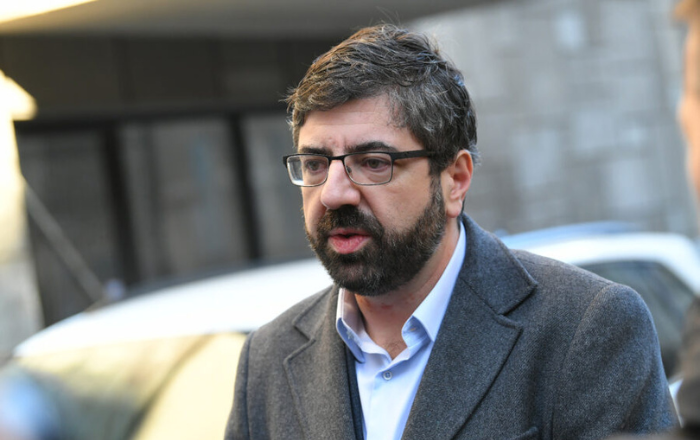The proposed Law on Referenda and People’s Initiative was entered into parliamentary procedure without adequate public debate, and the government intends to propose changes to the Constitution immediately after its adoption. This way of changing the Constitution could help Aleksandar Vučić increase the number of times he could serve as President of Serbia in the near future, but also paves the way for manipulations with harmful projects such as Rio Tinto. In addition, the expert public warns that referenda on such solutions will make abuse of power easier on various fronts.

Speakers at the conference: Violeta Beširević, full professor of constitutional law at Union University, member of CEPRIS, Jelena Jerinić, full professor at Union University, member of the Legal Team of Don’t Let Belgrade Drown, Biljana Đorđević, Assistant Professor at the Faculty of Political Science, Member of the Small Council of Don’t Let Belgrade Drown
The Don’t Let Belgrade Drown Movement has presented the possible disastrous consequences of the proposed Law on Referenda and People’s Initiative to the public. At yesterday’s press conference, it was pointed out that the government intends to abolish the 50 percent threshold, so it would not have to explain to the electorate the essence of changing the Constitution, and other issues in referenda down the line, because then there would be no need to motivate them to go out and vote.
Another element used to alienate politics from the people is the proposed high cost of verifying signatures for referenda at the local, provincial or state level. Such a law should encourage, not hinder, participation in political life, which is one of the main principles on which the program of the Don’t Let Belgrade Drown Movement is based.
Speakers at the press conference underlined that in an autocracy such as Serbia, where there are no conditions for free and fair elections, the conditions for holding a referendum are equally bad if not worse.
In addition, many important recommendations of the Venice Commission were ignored, for example that the first referendum be held at least a year after the Law is changed, and here it will probably happen within a few months, before the general and Belgrade elections.
The Law on Referendum and People’s Initiative is a model for further abuses
Biljana Đorđević, member of the Small Council of the Don’t Let Belgrade Drown Movement, stated that the adoption of the Law without a public debate, with its entry into force the day after the announcement and, as well as the announcement of a constitutional referendum a few days later, is a demonstration of how the regime led by Aleksandar Vucic will continue to make changes to the governance structure.
“We have reason to believe that not only the upcoming changes in the field of justice, where the executive and legislative branches have not given up direct political influence on the election of judges and prosecutors, but also some future constitutional changes, will go in the direction of dismantling even this façade of constitutional democracy.” , she stated and warned that this way, the current President could secure an increase in the number of terms he could occupy that position. The Prime Minister of Hungary, Viktor Orban, and the President of Turkey, Recep Tayyip Erdogan, used the changes to the constitution in a similar way, reminded Đorđević, who is an assistant professor at the Faculty of Political Sciences, and called it autocratic legalism.
She called on the authorities to hold a genuine public debate on the proposed law. “If he does not do that, it will become clear that tectonic constitutional changes await us, which the regime will try to sneak by citizens,” said Biljana Đorđević.
The power of procrastination should not be underestimated
The Law states that it enters into force one day after its publication, contrary to the Constitution, which provides for eight days, and only exceptionally earlier if there are particularly justified reasons. “We have not managed to do it for 15 years, so now those 8 days mean a lot to us – that is not a justified reason,” reminded Jelena Jerinić, a full professor at the Faculty of Law at Union University and a member of the legal team of the Don’t Let Belgrade Drown Movement.
There are improvements, but this proposal also takes steps backwards, which is why this law will not encourage wider application of the people’s initiative, especially at the local level, she said.
Serbia and Hungary are examples of populist regimes with two-thirds support in parliament using democratic mechanisms to undermine democracy, according to Violeta Beširević, a full professor of constitutional law at Union University Law School and a member of the Center for Judicial Research Cepris.
She underlined that the 1994 Law on Referenda was in force and that it should have been harmonized with the 2006 constitution as soon as it entered into force. Instead, they waited for 15 years for the government to push it through now, Beširević added.
“The power to delay the adoption of laws or court decisions should not be underestimated, for example, which the Serbian Constitutional Court often does in politically sensitive situations. Playing with the time of the adoption of the law is one of the tactics of the ruling regime. The passage of time facilitates the status quo “, she stated.
More from Ne davimo Beograd:
Lazovic to attend EP session: I expect them to call for rerun of Serbian elections
MP of the opposition Green-Left Front Radomir Lazovic said that, in its resolution on the Serbian elections, he expects the European Parliament (EP) to voice its position that elections must be repeated at all levels in Serbia, especially in Belgrade, where the opposition was robbed of its clear victory.
We Demand Responsibility and Restraint in Solving the Crisis in the North of Kosovo
We call for responsibility and restraint in solving the crisis in the north of Kosovo, in the Banjska monastery, so that the conflict does not escalate or lead to a new tragedy. We condemn provocations and violence from any side, and demand a thorough investigation.
Setting the Community of Serb Municipalities and membership in the EU as necessary first step towards the reconciliation of the two peoples
It is a real tragedy of our society that the same people who led to the fact that Kosovo is not de facto part of the constitutional order of






